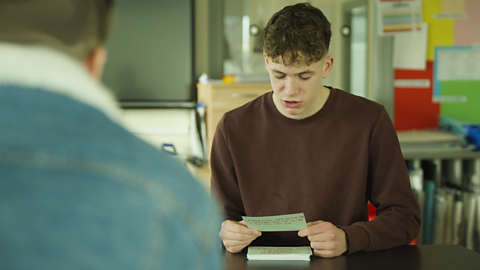This article was first published in 2019 and updated in May 2024.
Your last minute revision might have got you feeling like youâre chained to your notes with no hope of ever leaving your room. But it doesnât have to be like that at all.
You can soak up important information as part of your everyday life too. You can do it around the house, while seeing your friends, or when youâre out and about in the open air.
Sounds too good to be true? Fear not. Take a look at our suggestions for revising away from your desk, and decide what works for you.

Surround yourself with information
Your entire home can aid your study in the run-up to an exam. Invest in some sticky notes and pop them up in the place you visit most throughout the day.
Get that historical quote, scientific diagram or maths equation up on the fridge door, so youâre reminded of it every time you reach for the milk. Pop it on the bathroom mirror and you can revise while brushing your teeth too.
Sticky notes work like flashcards, especially if you cover one of them up and try to remember whatâs written on them.
Itâs all about active recall, where you are encouraged to remember something as a whole, rather than reading it from the page.
Revising concepts in this way is known to create stronger neural connections in your memory and help the info stay in your brain.

Exercise
Revision time can be stressful and one proven way of tackling those nerves is to exercise. Itâs important to take breaks anyway, but incorporating exercise into that time out can reduce those stress levels, even if you fit one 20-minute session into your day.

While youâre breaking a sweat, your brain produces the chemicals serotonin and dopamine, which make you feel good and improve your mood. Endorphins also rush around your body. These help you retain important information, so by popping out for a jog youâre actually preparing your brain for forthcoming study sessions.
If going for a run sounds daunting, start slowly at home. Try two sets of 15 star jumps, followed by two sets of 15 squats (without using weights). These are part of the NHS recommendations for cardio exercise which beginners can attempt indoors. Just make sure you have enough ceiling clearance before you start jumping!
Video call your friends
Get a few of your pals together on a video call to test each other on those challenging subjects can be a productive way of taking a break.

Make a quiz of it to make it feel even less like a study session. Find out which of your friends knows the most of those key dates in the or the process of . Itâs a bit of fun and youâre learning from each otherâs knowledge at the same time.

Take your study outside
If itâs a nice day, get yourself out there. Study notes are that much more inviting when read in the sunshine. Youâre also boosting your vitamin D intake, which is good for your health.
Combine a run to your local park with a study session once you get there and youâre also combing the benefits of exercise on your brain with a relaxing revision hour (or two) in the open air as well. Best remember to take a brolly though - just in case!

Listening to music and podcasts
Nick Grimshaw and Professor Catherine Loveday recently spoke to Bitesize about , and Dr Alex, best known for his stint on Love Island, , whether itâs hardcore grime or K-Pop, can help you calm down and de-stress, but donât listen to anything you dislike just for the sake of it, or it might have the opposite effect!
However, some students find listening to music while revising quite distracting, so find out if it works for you or not.

Podcasts from ±«Óătv Bitesize and ±«Óătv Sounds
Bitesize and ±«Óătv Sounds have teamed up to help you revise core GCSE Biology, GCSE Chemistry and GCSE Physics topics as well as GCSE English Literature set texts and poetry with our Bitesize podcasts. You can also get tips and advice with our Study Support podcasts to help your revision feel more manageable.
±«Óătv Sounds is where you can catch the latest music tracks, discover binge-worthy podcasts or listen to live radio, all in one place.
Why not try a revision podcast episode?
Listen to an episode from one of our revision podcasts series here. You can find the full series on ±«Óătv Sounds.
Jean and Carl explore the themes of Shakespeare's Macbeth.
Carl: Hello, and welcome to the Bitesize English literature podcast.
Jean: I'm Jean Menzies, author and ancient historian.
Carl: I'm Carl Anka, journalist and author.
Jean: We're here today to help you dive a little deeper into some of the texts in GCSE English literature.
Carl: It's worth noting that there will be spoilers in this as we look into each text as a whole. So if you're not quite finished reading, or you're not quite ready for spoilers, just come back later.
Jean: There's plenty here to get your teeth stuck into.
Carl: Now, you've clearly done something right, because you've made it here. If you want to hear all the episodes in this podcast, make sure you download the ±«Óătv sounds app.
Jean: And don't forget that whilst you're in the ±«Óătv sounds app, there's loads of other things you can use to help you with your revision â full versions of some of the texts you might be studying, revision playlists, and other Bitesize podcast series to help with different subjects. In this series, we'll be covering some of the key things you need to know about Macbeth: the plot, the characters, the themes, and the language Shakespeare uses.
Carl: In this episode, we're going to look at the plot of Macbeth and I'm going to tell you something now Jean - Macbeth is my text. This is one of my favourites and I'm very excited to take a closer look at some of these key moments. Is it weird to say Macbeth is one of my favourites?
Jean: Absolutely not - there is so much to keep you hooked in this play. I completely get it.
Carl: Let's get into this one then.
EXTRACT
Macbeth: Speak, if you can: what are you?
First Witch: All hail, Macbeth, hail to thee Thane of Glamis.
Second Witch: All hail, Macbeth, hail to thee Thane of Cawdor.
Third Witch: All hail, Macbeth, that shalt be King hereafter.
Banquo: Good sir, why do you start, and seem to fear things that do sound so fair?
Carl: Right, we've stepped inside the story. And straight into Act 1 scene 3, where Macbeth has encountered three witches for the very first time. Now, Macbeth is the Thane of Glamis. And I should probably say at this point in time that a thane is a nobleman who owns land that's been given to him by the king in exchange for his military services. Macbeth is on his way home from a battle with his best friend Banquo, where they've been successful against the Norwegians. Macbeth in particular has played a huge role in that success. Heâs killed someone. He chopped him from his chin down to his belly button. So yeah, very early on, we find out Macbeth is a good fighter - big, strong lad. And on the way back with him and Banquo they meet the three witches who predict a number of things, including that Macbeth will one day become the King of Scotland.
Jean: I mean, seriously, what would you do? You're heading home today and three witches stop you and tell you that one of your greatest dreams is going to come true. I mean, you think they were trying to wind you up, wouldn't you?
Carl: Yeah, it would be my first thing. But then the witches tell them a number of things. They first greet him as the Thane of Glamis, which is what he already is. And then they predict he's going to be the Thane of Cawdor, and then they say heâs gonna be the King of Scotland afterwards. They also tell him that the sons of Banquo will be king one day as well, which is interesting. He doesn't think any of these predictions will come true. The first one comes true, like that - pretty much the moment he gets home, he finds that he's gonna be made the Thane of Cawdor when King Duncan awards it to him for his victory in the battle. So then Macbeth, the cogs start turning, Macbeth begins to wonder if the other predictions will become true.
Jean: And Macbeth is an ambitious man. So for this to feel like a possibility must be really exciting for him.
Carl: Macbethâs wife, who is referred to as Lady Macbeth, is even more ambitious and ruthless than Macbeth is. So, once when Macbeth tells her about the witchesâ prophecy, Lady Macbeth is fully on board with the plan for Macbeth to become king, which also includes a little spot of murder. She says, you know, maybe you should murder Duncan, when Duncan comes around to visit Macbeth in Macbethâs castle.
EXTRACT
Macbeth: Is this a dagger which I see before me, the handle toward my hand? Come, let me clutch thee. I have thee not, and yet I see thee still.
Jean: You canât discuss the plot of Macbeth without hearing this line - âIs this a dagger which I see before meâ, one of the most famous lines of the play, and of Shakespeare's actually.
Carl: This is just at the point where Macbeth is on his way to do the deed and murder Duncan, when he sees a dagger pointing him in the direction of the king. We don't know if it's a hallucination, but moments after saying this Macbeth takes his own dagger from his belt and commits the deed. He murders Duncan. He hesitates just before he does it, but Lady Macbeth is very encouraging saying they have to go through with their plan.
Jean: Such a supportive spouse.
Carl: Of sortsâŠ
Jean: So it's Macduff who finds Duncan murdered but Macbeth and Lady Macbeth are able to use the king's guard as a cover for their crime. Meanwhile, Duncanâs sons disappear as they're scared for their lives, which meansâŠ
Carl: Dun dun dun dun dun. Macbeth becomes the King of Scotland, just like the witches said he would.
EXTRACT
Banquo: Thou hast it now: King, Cawdor, Glamis, all,
As the weird women promised, and I fear
Thou play'dst most foully for 't.
Carl: That extract that we just heard there - that is Banquo, Macbeth's best mate. He was there the day the witches told Macbeth about the prophecy, and he knows that everything isn't as what it seems.
EXTRACT
Banquo: And I fear Thou play'dst most foully for 't.
Carl: Now, what does that mean? You may have heard the term foul play. That is a sentence that is all about violence and murder in certain crimes. Banquo is suggesting that he's suspicious about Macbethâs involvement in the death of King Duncan. Now, we, the audience and the reader, know that Banquo's suspicions are correct. Macbeth did do a murder - Banquo's not totally sure. And then Macbeth decides something needs to be done about it.
Jean: He does another murder, obviously, because killing people is clearly what he does now.
Carl: Yeah. The first Macbeth that you meet when the play starts, Macbeth did murders but he was doing it in service of his king in battle. And this was described as noble, and to help his country of Scotland. But now, as things progress and Duncan has been murdered, and now that Banquo has been murdered, Macbeth is entirely self-serving. He's using violence and murder to push himself forward and to put others down. The whole play of Macbeth is about how ambition and the love of power can destroy someone and those around him. Right? This is something we're hearing unfolding every single scene. Banquo was Macbethâs best friend. But Macbeth turns against him, because Macbethâs need for power and the need to protect his own power warps him. And there's also Lady Macbeth, who helps convince him again and again that these deadly decisions are the right things to do.
Jean: And he has changed and started committing these acts of absolute evil since he heard the witchesâ prophecy. But there's reasons to think that there could be guilt there, too. I mean, one of the interpretations is that he feels so guilty that he actually sees the ghost of Banquo later on. And because he's the only one who can see him, those around him start to wonder if he's imagining it, including Lady Macbeth.
Carl: There's a decent argument to be made that he doesn't actually feel guilty at all. And that heâs driven as a consequence of his sin of killing the king. People in the Jacobean era, which is the era between 1603 and 1625, believe that what behaviour was going on was punishment for Macbethâs sin.
Jean: Either way, the witches have a lot to answer for, but Macbeth wants to know more from them.
EXTRACT
Witches: Double, double toil and trouble. Fire burn and caldron bubble.
Carl: And there's the other famous line: âDouble, double toil and trouble, fire burn and cauldron bubble.â I love this line, so so much. It's the one that a lot of people quote when you say, âOh, I'm studying Macbeth.â
Jean: I'm not even sure everyone remembers it's from Macbeth. I mean, why would you, it's in so many other pieces of pop culture as well, but that is where it comes from. It's just a really popular line now that's synonymous with witches and spells. So Macbeth has come back to see the witches here, and they tell him three things. Beware Macduff, the Thane of Fife. None of woman born shall harm Macbeth. And Macbeth shall never vanquished be, until Great Birnam wood to high Dunsinane hill shall come against him.
Carl: Now these are slightly more complex prophecies than the first batch. Especially because two and three are supposed to be logically and physically impossible. None of woman born can harm him and a forest physically moving location, so it can hurt Macbeth makes Macbeth feel safe. Well, those things certainly canât happen. I'm absolutely cushty. But it's the first prophecy. Beware Macduff - that comes true quite quickly, because Macbeth finds out that Macduff, Thane of Fife, has gone to join Malcolm who is Duncanâs son, in England. So what'd you think Macbeth is gonna do about this prophecy?
Jean: Yep, you've got it. He does a murder. He seizes Macduffâs castle and has his wife and children killed. This in particular feels as if it's the most brutal murder up until this point in the play. But that does not prove to be a smart move, because Macduff is quite obviously devastated, and therefore vows to have revenge.
Carl: That's the thing about Macbeth. There is so much going on all the time.
Jean: Yeah, it really all is happening. And there's still a lot more to come. Because we haven't heard from Lady Macbeth for a while. That's because her own guilt has actually started to take its toll on her and she's sleepwalking around the castle, remembering all the evil things she's done.
Carl: Although that's the same thing we said about Macbeth. Some Jacobeans will believe that guilt is happening to Lady Macbeth. And some believe that this is insanity happening to Lady Macbeth as well.
EXTRACT
Lady Macbeth: Out, damned spot; out, I say!
Carl: So that we just heard now, âOut, damned spotâ - that is one of the most famous speeches from Lady Macbeth. It's Lady Macbeth referring to imaginary blood that she can see on her hands. She can't get away from the guilt and responsibility for all the deaths that have occurred, and she's having a breakdown. In Act 5, the final act of the play, Macbeth finds out that Lady Macbeth has died. Itâs never fully explained how or why Lady Macbeth died. And Macbeth himself seems pretty resigned, uninterested. There is a small suggestion that Lady Macbeth may have taken her own life. And it's also some suggestion that basically, Macbeth doesn't care anymore. It is the tragic downfall, so we began this play with so much determination. But we know that Macbeth is all about ambition. And we know how love of power that motivated Macbeth and Lady Macbeth in the beginning is detrimental to both of them in the end.
Jean: Act 5 scene 6 - Malcolm and Macduffâs invasion has begun. At this point, Macbeth still thinks he's protected by the witches' predictions, but he's wrong. When the invading army cut down the trees in Birnam wood to use as camouflage as they move to Macbeth's castle in Dunsinane, it seems as though the trees themselves are moving, and thus making the third of the witchesâ latest prophecies come true.
Carl: So they said that Macbeth will never be beaten until the woods moved, and here they are. Right?
Jean: Exactly. It's such a clever way to make that come about. I absolutely love that revelation in that moment in the play.
EXTRACT
Macbeth: I bear a charmed life, which must not yield,
To one of woman born.
Macduff: Despair thy charm;
And let the angel whom thou still hast served
Tell thee, Macduff was from his mother's womb
Untimely ripp'd.
Carl: It's one of the greatest twists ever written I think, this one, because when you read it, that he can't be harmed by someone born of woman, you have no idea where Shakespeare is going with that. Are the witches lying? Are they trying to bring him down? And then Macduff answers them easily. He was from his mother's womb untimely ripped.
Jean: I know, another seriously clever way to spin that that I never could have come up with. I remember the first time I read that. And you're right. It's that moment, like when you're watching a great thriller, and it takes an unexpected turn that has you shouting at the TV. So Macduff was untimely ripped from his mother's womb. So we can assume, delivered by Caesarean rather than born of woman in the traditional sense. So he's able to kill and behead Macbeth. Malcolm becomes the new King of Scotland and we hear how accepting the witches' prophecies leads directly to Macbeth's downfall.
Carl: So, thank you for listening to Episode One of the Bitesize English literature podcast. And joining us as we explored the plot of Macbeth.
Jean: Well, there's actually still a lot more to learn. So take a listen to the rest of the episodes of the Bitesize English literature podcast on ±«Óătv Sounds to find out more. In Episode Two we'll be taking a look at some of the characters from Macbeth, particularly Macbeth and Lady Macbeth.
James and Ellie talk through the topic of gravity.
ELLIE: Hello and welcome to the ±«Óătv Bitesize Physics podcast.
JAMES: The series designed to help you tackle your GCSE in physics and combined science. I'm James Stewart, I'm a climate science expert and TV presenter.
ELLIE: And I'm Ellie Hurer, a bioscience PhD researcher. We're covering lots of different aspects of forces in this series, so make sure to listen to the rest of the episodes too.
JAMES: Yeah, and they're really good. Okay, let's get started because today, I thought so, because today we're talking all about the force that keeps our feet on the ground, gravity.
ELLIE: While we often think about space and astronauts when we talk about gravity, gravity actually acts all around us every single day. Because the definition of gravity is a force of attraction between two objects.
JAMES: The gravitational field is the area around an object where another object will feel a force of gravitational attraction from it.
Gravitational field strength is measured in newtons per kilogram, written out as ânâ forward slash âkgâ.
ELLIE: And the size of the gravitational field strength affects the force of gravity acting on an object in that gravitational field. The other thing that affects the size of gravity is the object's mass. The bigger the mass, the greater the force of gravity.
JAMES: So one key thing to know that a lot of people misunderstand is that weight and mass are actually two different things.
ELLIE: Yeah, so when we say, oh, this loaf of bread weighs 400 grams, we're actually saying that the mass of the loaf of bread is 400 grams.
JAMES: Because mass is about the amount of matter, whereas weight is a force and is the heaviness due to gravity.
ELLIE: Exactly. So let me tell you about the equation you need to calculate the force of weight of an object.
JAMES: Yeah, I'm gonna get my pen and paper out for this one, so if you're listening, please feel free to do the same thing and write along as we go through this.
ELLIE: So, weight equals mass multiplied by the gravitational field strength.
JAMES: Weight is measured in newtons. Mass is measured in kilograms and gravitational field strength is measured in newtons per kilogram.
ELLIE: So to calculate the weight of an object in newtons, you multiply its mass in kilograms by the strength of the gravitational field in newtons per kilogram.
JAMES: That was a lot. Don't panic. Let's just hear that again.
ELLIE: So weight equals mass multiplied by the gravitational field strength.
JAMES: Weight is measured in newtons, mass is measured in kilograms, and gravitational field strength is measured in newtons per kilogram.
ELLIE: So, to calculate the weight of an object in Newtons, you multiply its mass in kilograms by the strength of the gravitational field in Newtons per kilogram.
JAMES: Right, let's try out some examples then. And if you don't have your pen and paper just yet, now would be the perfect time to grab them and you can write down these calculations with us as we go along.
ELLIE: Let's say we want to find out the force of gravity, their weight, acting on your physics teacher as they stand at the front of the classroom.
JAMES: Good image. Now first, you would need to find out their mass. Now let's say it's 80 kilograms, then you need to know the gravitational field strength of the planet they're standing on, which for the planet of Earth is 9.8 newtons per kilogram.
ELLIE: So to measure the force of weight acting on them, you would write down their mass of 80 kilograms and then multiply it by the Earth's gravitational field strength of 9.8 newtons per kilogram to get the answer 784.
JAMES: And because weight is measured in newtons, their weight would be 784 newtons downward. We always have to include those units. And because weight is a force, which is a vector quantity (more about that in episode one), we also have to say the direction it is in, which in this case is downwards.
ELLIE: In those instances, the weight of an object and its mass are directly proportional. So let's say if something had a bigger mass, its weight would be higher. And if something had a smaller mass, its weight would be lower.
JAMES: Exactly. And when we're measuring weight in terms of gravity, we don't use regular kitchen scales. We use something called a newton meter, also known as a calibrated spring balance.
ELLIE: And when we do that, we say that the weight of an object, or in this case, person, acts at a single point. The object or person's centre of mass. The force of gravity, weight, always acts from the middle of an object, straight down.
JAMES: Okay, that was a lot, but I hope that helped you understand gravity a little bit more.
ELLIE: So, let's recap the three main points.
Firstly, gravity is a force of attraction between two objects. The next point is, mass is the amount of matter in an object. However, weight is the force of gravity acting from the middle of the object straight down.
And finally, the equation to find out an object's weight is mass multiplied by gravitational field strength equals weight.
There's your key points about gravity. In the next episode of Bitesize Physics, we're going to dig into work done and energy transfer, and I cannot wait.
JAMES: I believe you. Thank you for listening to ±«Óătv Physics. If you found this helpful, and hopefully you did, please do go back and listen, make some notes, so you can come back here and always have this as your point to revise from.
JAMES: Thank you, bye!
ELLIE: Bye!
Dr Alex Lathbridge explores the structure of cells.
Hello, Iâm Dr Alex Lathbridge and this is Bitesize Biology.
In this podcast Iâm going to take you through the main things you need to know for your GCSE Biology exam.
Iâm going to be talking about things as small as cells, as big as rainforests and everything in-between.
Thereâs going to be a lot for you to remember. And as we go through all of the topics, there will be a few key terms that youâre going to need to learn off by heart. But donât worry, I did it, you can do it too.
This is the is the first episode of a nine-part series on The Cell, letâs go.
All living things are made of cells, which is why theyâre called the building blocks of life.
Plants are made of cells, animals are made of cells, humans are animals so even you, yes you, are made of cells.
In fact, right now, you are a giant, complex container made out of trillions of cells all working together, to learn about cells.
Anyway, today weâre going to take it back to basics and find out about the structure of the cell and the two main types that you are going to need to know.
The thing about cells is that they are small, like really, really small.
Anything between 0.01 and 0.1mm across.
This means they are too small to see with the naked eye. In order to study them properly, scientists first had to invent really powerful microscopes in order to see whatâs inside them.
If this is all new to you, donât worry, scientists like me are learning stuff all the time too.
Nearly all cells have four key things in common:
They have a membrane. This holds the cell together, keeps its contents inside and controls what can enter and exit the cell. Think of it like a balloon that can let things in and out.
They have a cytoplasm, which is kind of like a really useful jelly. Itâs where all the chemical reactions take place in the cell. Think of it like water inside that balloon.
They have DNA. DNA is genetic material. And it contains all the information that tells the cell what to do, your cells following all these instructions is how you develop and grow.
They have ribosomes. These are sort of like mini-robots which make proteins based on the instructions found in DNA.
So, you could say that a simple cell is just a tiny a water balloon, filled with instructions and little protein-making robots.
Or, if you want to pass your exams, you could say that a cell is between 0.01 and 0.1mm across and made of a cell membrane containing cytoplasm, DNA and ribosomes.
Now, there are two types of cells youâll need to know about:
Eukaryotic and prokaryotic cells.
You are a eukaryotic organism. This means that you are made up of lots of different types of cells, most of which have a nucleus.
These kinds of cells, the ones that work together with lots of other kinds of cells to make up a plant or animal or human, are called eukaryotic. Easy to remember: because you are eukaryotic.
Letâs think about most eukaryotic animal cells. As well as the stuff weâve just talked about (that water balloon) most eukaryotic cells also have a nucleus.
Remember that cells always contain DNA? Well, in eukaryotic cells, the genetic material is kept inside a nucleus. Think of it like a little folder.
And they have Mitochondria. This is where cells release the energy they need, thatâs where respiration takes place. Think of them like little batteries.
So, when it comes to most eukaryotic animal cells, weâve got our water balloon (a membrane filled with cytoplasm), containing instructions to make proteins inside a little folder (DNA inside a nucleus), robots to synthesise the proteins (ribosomes) and batteries to power the whole thing (or mitochondria).
And just because things are never that simple, in animals red blood cells are the exception because they donât have a nucleus.
Itâs worth drawing it out, I've always found it useful, even just a quick doodle. Remember, there are lots of diagrams on the Bitesize website. It might be useful to look at those while you listen.
Now, although you might think you are a little bit more interesting than a lettuce, most eukaryotic cells in plants have some extra stuff on top of all that. So, plant cells have a membrane, cytoplasm, DNA, a nucleus and mitochondria and:
They have an extra layer outside of the cell membrane called the cell wall. Plants need a cell wall because they need to stand up straight, but they donât have a skeleton, and this is where the cell wall comes in, it helps keep plants upright.
Green cells in plantsâ stems and leaves have chloroplasts, which contain chlorophyll and the enzymes needed for photosynthesis. Photosynthesis is really important and weâre going to come back to it later in the series, but for now what you need to know is that chloroplasts contain the stuff that plant cells use to store energy from sunlight. Think of it like a little solar panel.
They also have a permanent vacuole. You can basically think of it like a little pocket inside of the cell, filled with something called cell sap that helps to keep the cell in shape.
And remember how red blood cells donât have a nucleus? Most plant root cells donât have chloroplasts, so theyâre white not green.
Ok, so that was eukaryotic cells. Now letâs look at prokaryotic cells
Prokaryotic cells are always single celled organisms.
Like bacteria. The whole organism is just one tiny cell that does it all.
But just because itâs small doesnât mean itâs not important. We need bacteria in our guts, to help us break down food and the environment is the same, the life cycle of things dying, and their nutrients being returned to the earth depends on bacteria.
This is why you should be very pro prokaryotic cells.
Like all cells, prokaryotes have a cell membrane, cytoplasm, DNA, and ribosomes.
However, there are two main differences:
Firstly, the DNA isnât inside a nucleus, instead it floats free inside the cytoplasm in a single circular loop of DNA, with some extra little bits of circular DNA called plasmids.
Secondly, prokaryotes also have a cell wall, outside of the membrane.
And yeah, all cells are microscopic but thereâs a big difference between eukaryotic cells and prokaryotic cells.
So eukaryotic cells, plant cells and animal cells, can be anything from 10 to 100x larger than prokaryotic cells, found in single celled organisms like bacteria.
Iâm Dr Alex Lathbridge and this is Bitesize Biology. To hear more, search Bitesize Biology on ±«Óătv Sounds.
Dr Sunayana Bhargava and Tulela Pea look at the history of the atomic model.
SUNAYANA: Iâm Dr Sunayana Bhargava, a scientist and poet.
TULELA: And Iâm Tulela Pea, a science communicator and podcaster.
SUNAYANA: And this is Bitesize Chemistry. This is the second episode in an eight-part series on atomic structure and the periodic table. In this episode, weâre going to look at the history of the atom and how that model has developed over the centuries.
TULELA: Weâll look at how this led to our understanding that atoms are made up from protons, neutrons and electrons.
SUNAYANA: And weâll end with a quick summary of the main important facts for you to take away because life is just so darn busy these days.
TULELA: But also because thatâs why weâre here after all - to help revise GCSE chemistry and combined science.
SUNAYANA: Our chat bot NNICK is with us again.
NNICK: Oh, I love Chemistry, I adore it, divine chemistry!
SUNAYANA: Before we unleash NNICK, what I like about the history of the structure of the atom is that itâs a really good example of how science works. You come up with a new idea or hypothesis, devise an experiment to test the hypothesis and if the evidence backs up your predictions then it becomes a better theory. And our understanding is a little better than it was before. And this is exactly true with how the model of the atom has developed throughout history.
TULELA: Totally! So if we begin say only 200 years ago, back then what we thought an atom looked like was actually quite basic, tiny.
SUNAYANA: Very, very tiny.
TULELA: Very, very, tiny spheres that canât be divided. This idea was proposed by a scientist from Manchester called John Dalton in 1804.
SUNAYANA: Actually, it kinda goes all the way back to the ancient Greeks and the word atom comes from the Greek âatomosâ â which means uncuttable.
TULELA: Nice trivia, Sunayana! But since then, we now know that atoms are composed of electrons, protons and neutrons arranged in a particular way.
SUNAYANA: So how did we get from there to our understanding today? NNICK, can you give us a quick history of the structure of the atom?
NNICK: The history of ideas about atoms. The most sensible, mature and adult way to discuss the history of ideas about atoms is through the medium of song.
SONG
Mr John Dalton imagined that atoms
Were miniature spheres that you cannot divide
And then JJ Thomson, who probably liked snacking
Described them as a plum pudding with electrons inside
Rutherford, who was Ernest, suggested a nucleus
Which no one had ever considered before
And around that were shells filled with orbiting electrons
According to that fascinating fellow Niels Bohr
Experiments suggested the existence of protons
Which contribute to the nucleus in a positive way
Add to those the neutrons discovered by Chadwick
And that's the atomic model which we still use today, OK!
SUNAYANA: Thanks, NNICK! Lots to unpack there but sounds like there are some key moments in this history of the atom that we should explore a little. And each one has progressed our understanding. First up, JJ Thomson. From his experiments, he concluded that atoms werenât solid spheres and he proposed that they looked more like a plum pudding.
TULELA: Who even eats plum pudding these days?
SUNAYANA: Sounds like the kind of dessert theyâd have had in 1904 when JJ Thomson came up with the idea. His plum pudding model could be thought of as a positively charged dough spread out evenly in which negatively charged electronsâŠ
TULELA: âŠthe plumsâŠ
SUNAYANA: âŠwere embedded. Quite simple, but an advance from the solid spheres model.
TULELA: Anyway, JJ Thomsonâs plum pudding model of the atom didnât last very long because only about a decade later, along comes Ernest Rutherford who tested Thomsonâs theory and proved that the plum pudding was way past its sell-by date. And he did this by showing that the positive charge in the atom wasnât spread out evenly and was in fact concentrated in the centre â the nucleus â where most of the mass of the atom is. And his evidence came from firing positively charged alpha-particles at a very thin sheet of gold foil.
SUNAYANA: Which I shall now demonstrate in the Bitesize studio purely by the magic of sound effects! If Thomsonâs plum pudding model was correct then when I fire some alpha particles at the gold foilâŠ
TULELA: Whoa! Careful with that sound effect, Sunayana!
SUNAYANA: Because the positive charges in the gold atoms were thought to be evenly spread out, all the alpha-particle bullets would simply pass straight through â or deflected just a tiny amount if they travelled close to an electron in the plum pudding.
But what they found is that although, yes, most of the alpha particle bullets did indeed pass straight through the foil undeflected, that a few alpha particles were deflected by extreme angles or even reflected backwards as if ricocheting from something.
TULELA: Whoa! Be careful!
SUNAYANA: And this could not have happened with the Thomson plum pudding model.
TULELA: Nice shooting, Sunayana. So, from this experiment, the new model of the atom was now one of mostly empty space where a positively charged mass or nucleus is concentrated at the centre and around this are the electrons. End of story?
SUNAYANA: Not quite yet! Because Rutherfordâs model only answered some questions but not all. It didnât tell us anything more about the electrons. To resolve those questions, we had to wait until Niels Bohr. We had to wait âtil he proposed a new development of the previous model of the atom. In this, the electrons orbit in particular shells â or energy levels to give them their correct name â which are precisely fixed distance from the nucleus. Again, his experimental observations agreed with his theorical calculations, updating the science and our ideas.
TULELA: So what does that mean, orbiting electrons in shells of a precise distance?
SUNAYANA: I like to think of them as if I were a gymnast twirling a baton over my head and I could choose a different length baton. The electrons are in the ends of the baton spinning around as I dance. They canât get any closer or further unless I change the baton size â which is like being in a different shell.
TULELA: Baton twirling and alpha particle sharp-shooter â youâd be so talented.
SUNAYANA: Thanks! But weâre not finished yet â because even Niels Bohrâs model needed refining and later experiments from Rutherford again led to the idea that the positively charged nucleus in the atom could be subdivided into a whole number of smaller particles called protons, with each proton having the same amount of positive charge.
TULELA: The end?
SUNAYANA: Not quite â because finally about 20 years after Rutherfordâs nuclear model, in 1932 James Chadwick put the final (for the moment) missing pieces into our model of the atom when he proved the existence of neutrons â chargeless particles, also within the atomâs nucleus.
TULELA: And that is the model we use to visualise the atom today. A nucleus of protons and neutrons, with orbiting electrons at specific distances from the nucleus.
SUNAYANA: And if you decide to study chemistry or physics at a higher level, youâll see how even that model becomes more exciting and extraordinary.
TULELA: And an exciting and extraordinary career in science awaits everyone â every nationality, every gender, every background.
SUNAYANA: I couldnât agree more.
SUNAYANA: Time for a quick interactive quiz. Three questions, 5 seconds each â here goesâŠ
TULELA: Question 1. Who came up with the plum pudding model of the atom?
SUNAYANA: Answer - JJ Thomson.
TULELA: Question 2. Who showed that this plum pudding wasnât correct and what was the experiment that proved this?
SUNAYANA: It was Ernest Rutherford who fired alpha particles at gold foil and updated the atom with his nuclear model.
TULELA: And Question 3. How did Niels Bohrâs model update the nuclear model further?
SUNAYANA: He brought in the idea of electrons orbiting the nucleus in energy shells.
TULELA: OK, Sunayana, quick summary?
SUNAYANA: Sure thing.
TULELA: Letâs go. From the ancient Greeks until about 200 years ago, the atom was thought of as tiny solid spheres.
SUNAYANA: Then JJ Thomson comes up with his plum pudding model.
TULELA: Rutherford fires alpha particles at gold foil and shows JJ Thomson was wrong. His nuclear model is one with a positive nucleus.
SUNAYANA: Bohrâs orbiting electron shells helps modify Rutherfordâs model.
TULELA: Protons are discovered by Rutherford. Neutrons are discovered by Chadwick and the current model of the atom is in place.
SUNAYANA: And all these developments are a really good example of how science progresses though theory, experiment and evidence.
TULELA: And now Iâm hungry. Plum pudding, anyone?
SUNAYANA: In episode three of this series, weâll be looking at the structure of the atom in more detail its size â its parts, charge and its mass.
Iâm Dr Sunayana Bhargava.
TULELA: And Iâm Tulela Pea.
SUNAYANA: To hear more, search âBitesize chemistryâ on ±«Óătv Sounds.
TULELA: Say bye, Sunayana.
SUNAYANA: Bye Sunayana.
TULELA: Thanks for listening.
The truth is that knuckling down with the notes has to be done, if we want to give ourselves a fighting chance in the exam hall. But vary that with alternative ways of absorbing the information you need, and revision time might get just that little bit easier.

Revision: How to get organised
Advice on how to get organised with your revision.

Discover our tips on how to manage your time and create a personalised revision plan.

How do I get started with revision?
How to get started with your revision.

